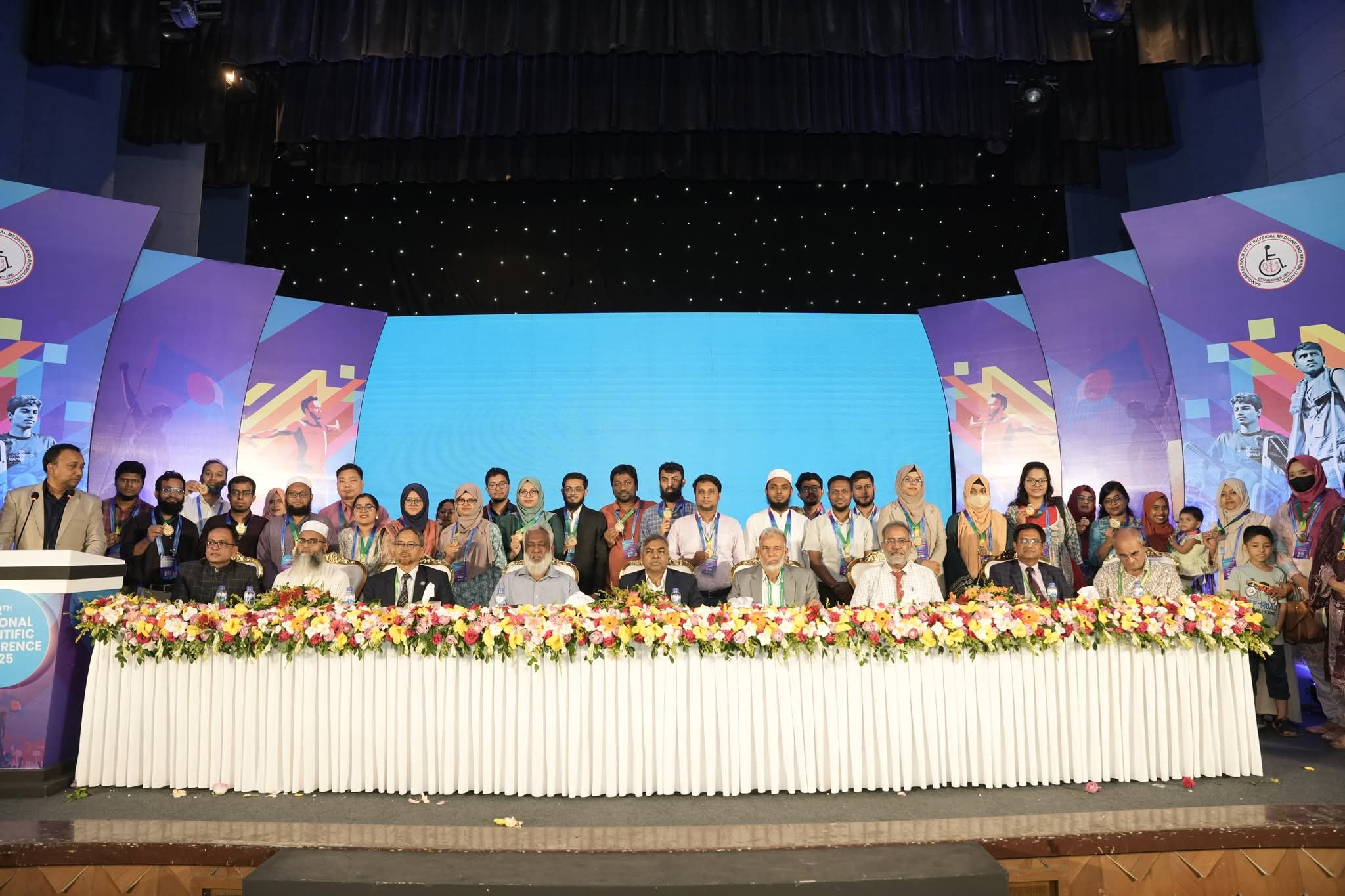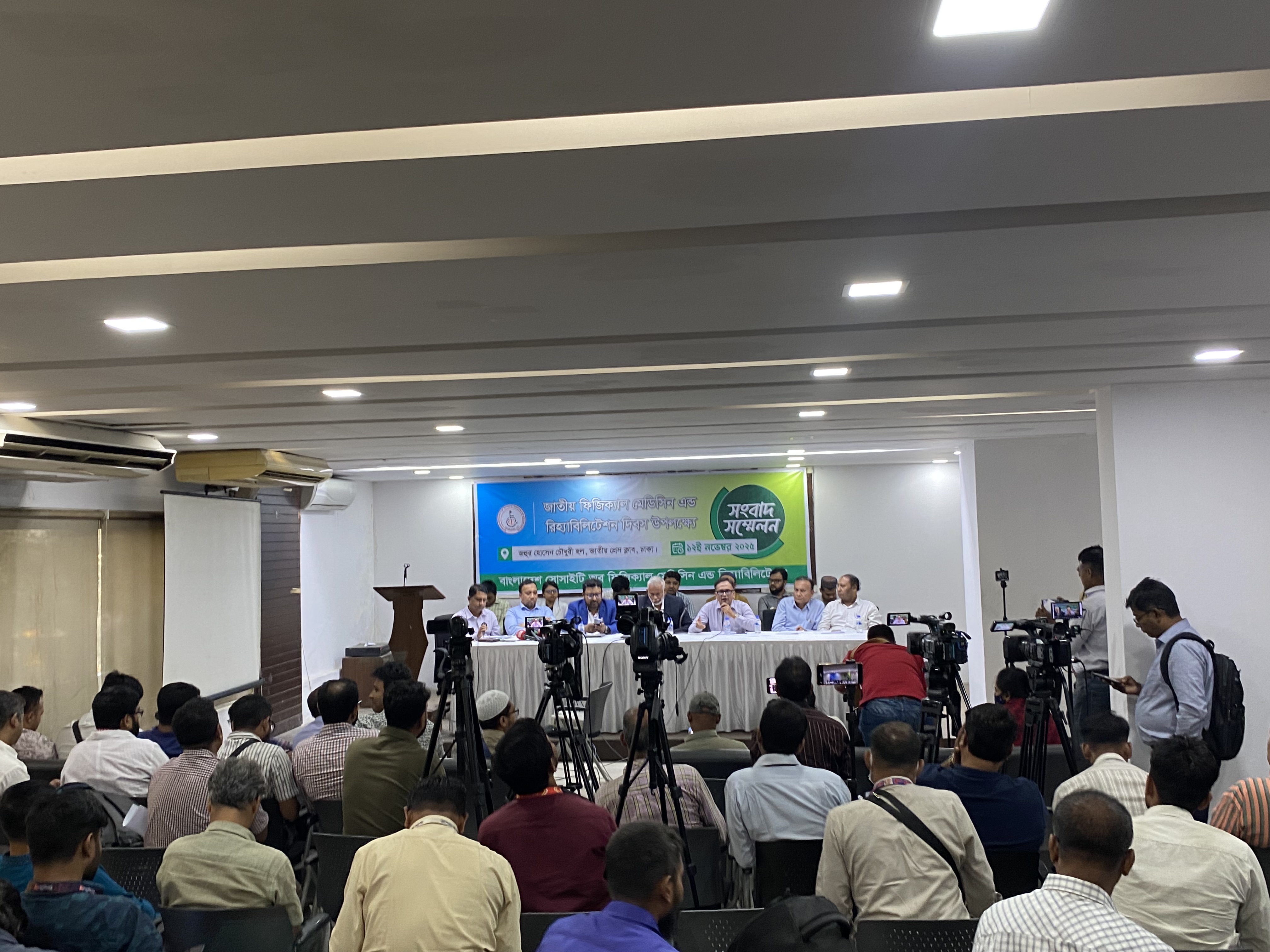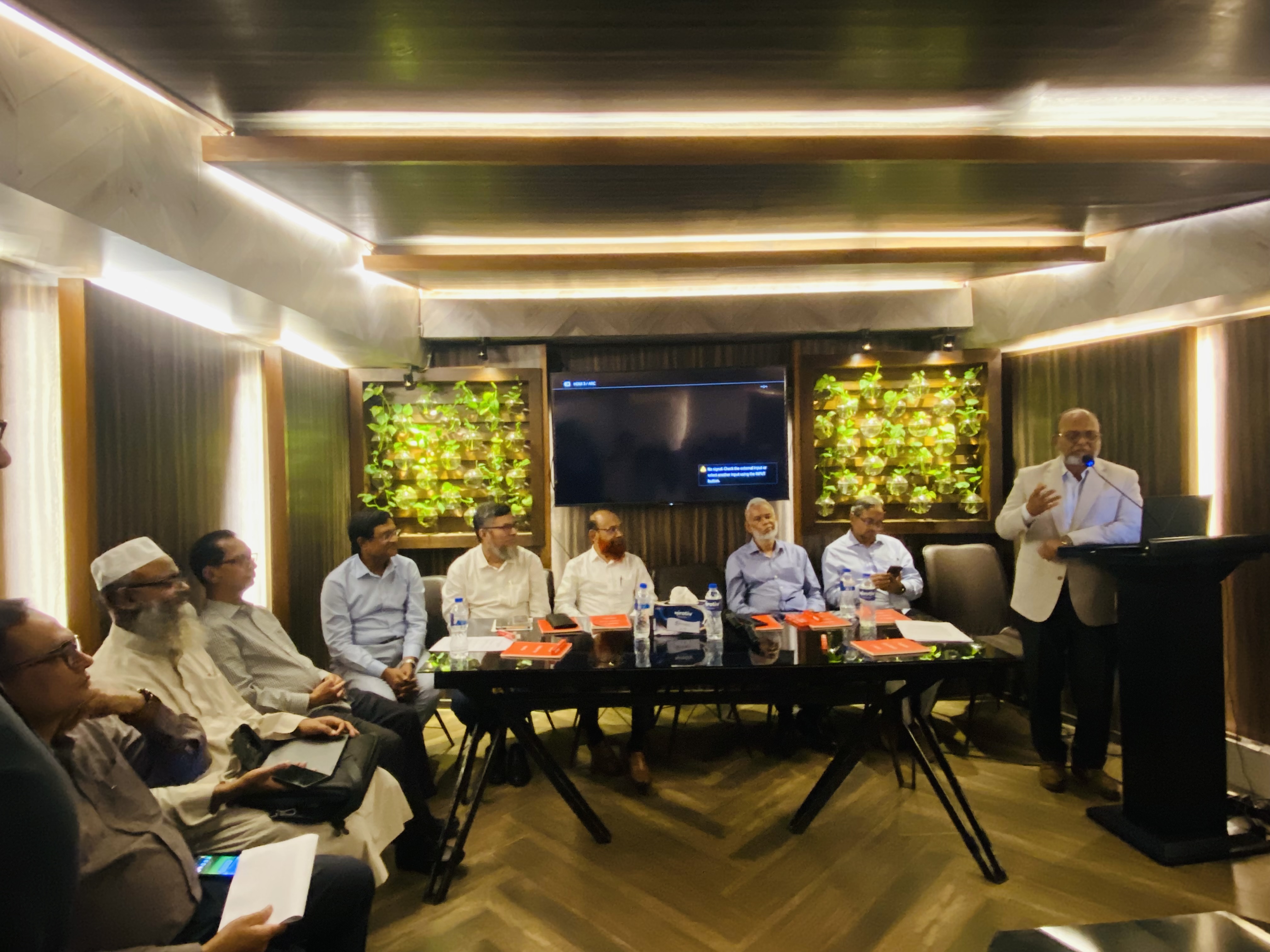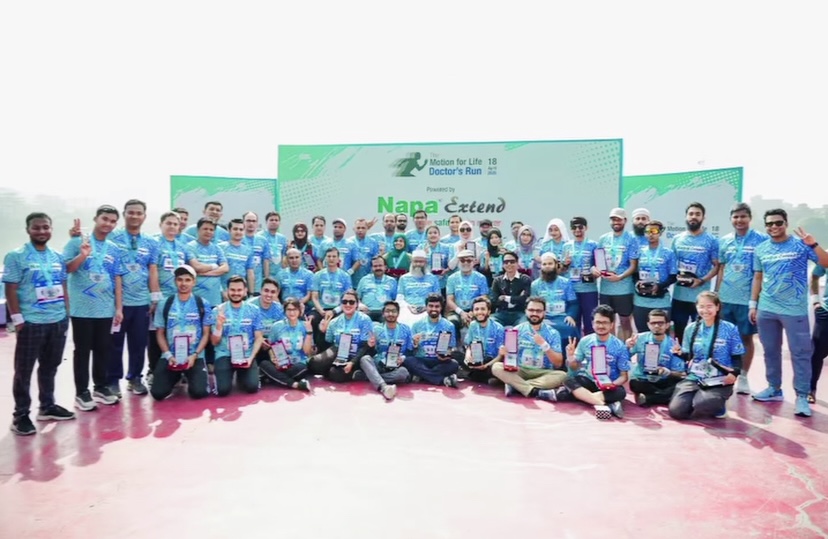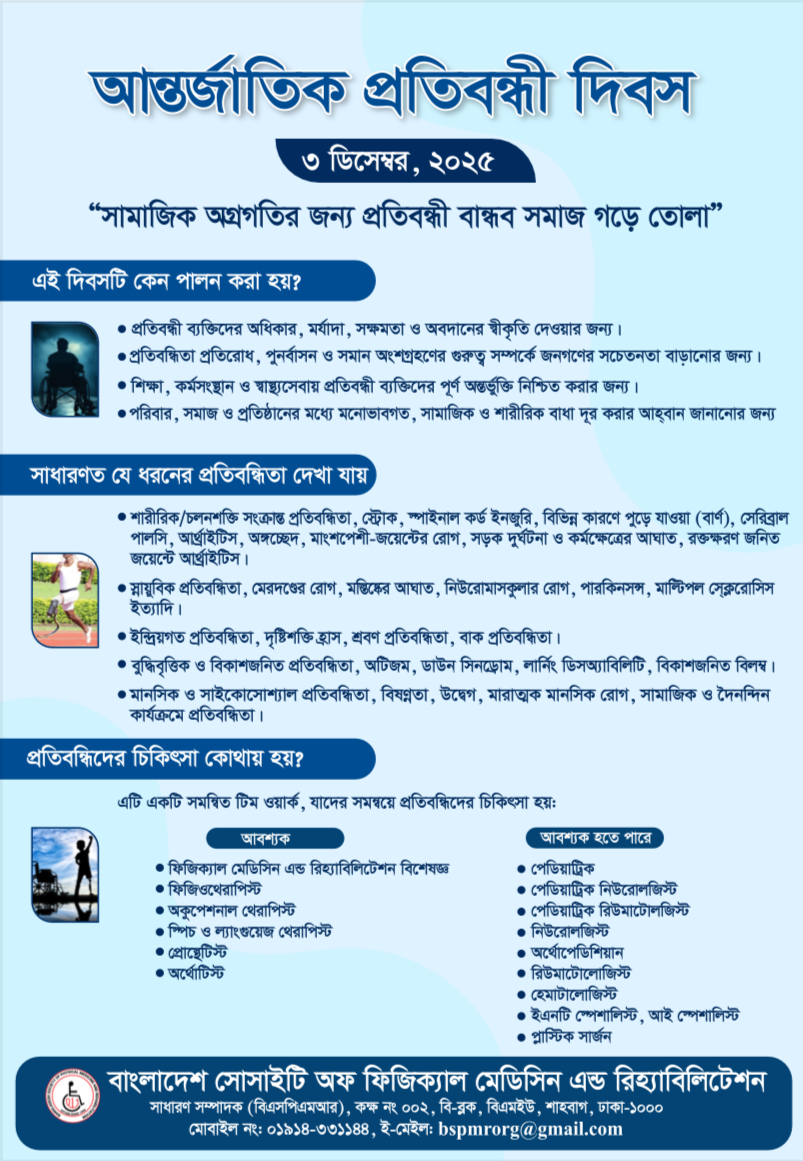Our Events
Friday
Sunday
We are delighted to announce a special Felicitation Program to honor and celebrate the achievements of our colleagues who have: Eligibility Criteria ✅ Successfully completed FCPS or MD (from January 2023 onwards) ✅ Registered participant of BSPMRCON 2025 ✅Life Member or General member of BSPMR This program is a humble tribute to acknowledge your hard work, dedication, and remarkable accomplishments in the journey of postgraduate medical education. 🔹 All eligible candidates are requested to submit their details through the provided link. 🤝 Your active participation and cooperation will be highly appreciated.
Sunday
We are delighted to announce a special Felicitation Program to honor and celebrate the achievements of our colleagues who have:
Wednesday
This prestigious award will honor a physiatrist who, within a short span of professional practice, has shown exemplary contributions to the advancement of rehabilitation medicine in Bangladesh and holds promise for future leadership in the specialty.
Wednesday
🔹 Eligibility
Wednesday
This award is designed to honor promising young researchers who demonstrate excellence, innovation, and commitment in advancing the science and practice of rehabilitation medicine.
Friday
Facilitator: • Professor Dr. MA Shakoor • Dr. Sakil, PhD • Dr. Nadim Kamal Coordinator: • Dr. Ziaur Rahman Chowdhury • Dr. Fatema Newaz • Dr. Mouni Sengupta • Dr. Anika • Dr. Ariful Islam N.B:Only 15 Participants
Seat Limit: 27
Available Seats: 0
Friday
Facilitator: • Dr. Hashmi Sina • Dr. Iftekhar • Dr. Abdur Rahim Coordinator: • Dr. Arman • Dr. Ileus • Dr. Sujoy N.B: Only 15 Participants
Seat Limit: 40
Available Seats: 16
Friday
Seat Limit: 20
Available Seats: 0
Friday
Facilitator: • Prof. M M Zaman • Dr. A K Azad • Dr. Mazharul Islam Coordinator: • Dr. Mominul N.B: Only 15 participants.
Sunday
Payment Test
Saturday
Published Research
Explore our collection of verified and published research.

Md. Atiquzzaman
Assistant Professor
Bangla Version of the Boston Carpal Tunnel Questionnaire: Translation, Cross-Cultural Adaptation, Validation and Reliability Assessment
Background: Self-reported instruments are outstanding predictor of symptom severity and functional status, hence represent a patient’s view and capture the full extent of disability. The Boston Carpal Tunnel Questionnaire (BCTQ) is a patient reported self-assessment tool for the peoples with Carpal Tunnel Syndrome (CTS). Objective: Our intension was to develop a reliable, validated and culturally adapted Bangla version of original BCTQ (B-BCTQ). Materials and Methods: The B-BCTQ was succeeded following a structured process that included translation, verification, compromise assessment, reverse translation, feedback, and final correction. B-BCTQ reliability and validity were conducted in 48 CTS patients. The reliability was evaluated by performing internal consistency and test–retest analyses. Its validity was assessed by comparing the B-BCTQ with the Physical functioning subscale (PF-10) of Short Form health Survey (SF-36) scale. Results: Cronbach’s alpha was 0.89 for symptom severity scale (SSS) and 0.86 for functional status scale (FSS). Also, Intra-class Correlation Coefficients (ICCs) were calculated as 0.86 for SSS and 0.91 for FSS. Pearson correlation (0.80 for SSS and 0.83 for FSS) analysis demonstrated that the B-BCTQ score was significantly correlated with the PF-10 of SF-36. All of the items were statistically significant (P<0.001). Conclusion: The B-BCTQ is successfully adapted. The study findings support the previous English version indicating its validity and reliability.
View Details
Dr. Md. Israt Hasan
Assistant Professor
Translation, cross-cultural adaptation and validation of English start back screening tool into Bangla for patients with low back pain
This study was intended to translate and culturally adapt the STarT back screening tool to produce an equivalent Bangla version. Total 58 patients with low back pain completed the newly developed Bangla version of STarT back screening tool and Bangla version of Ronald Morris Disability Questionnaire seven days apart. Reliability was assessed by internal consistency (Chronbach’s alpha for overall score 0.81 and for spychosocial subscale was 0.76) and test-retest reliability (intraclass correlation coefficient for overall score was 0.78 and for spychosocial subscale was 0.71). Reliability of Bangla version of STarT back screening tool was very good. Pearson’s correlation coefficient was carried out on the Bangla version of STarT back screening tool and Bangla version of RMDQ to assess construct validity (overall score was 0.88 and spychosocial subscale score was 0.83) which indicate a strong correlation between them. This study shows that the Bangla version of STarT back screening tool is a reliable, valid and culturally adapted responsive screening tool for the patients with low back pain.
View Details
Dr. Md. Israt Hasan
Assistant Professor
Bangla Version of the Boston Carpal Tunnel Questionnaire: Translation, Cross-Cultural Adaptation, Validation and Reliability Assessment
Background: Self-reported instruments are outstanding predictor of symptom severity and functional status, hence represent a patient’s view and capture the full extent of disability. The Boston Carpal Tunnel Questionnaire (BCTQ) is a patient reported self-assessment tool for the peoples with Carpal Tunnel Syndrome (CTS). Objective: Our intension was to develop a reliable, validated and culturally adapted Bangla version of original BCTQ (B-BCTQ). Materials and Methods: The B-BCTQ was succeeded following a structured process that included translation, verification, compromise assessment, reverse translation, feedback, and final correction. B-BCTQ reliability and validity were conducted in 48 CTS patients. The reliability was evaluated by performing internal consistency and test–retest analyses. Its validity was assessed by comparing the B-BCTQ with the Physical functioning subscale (PF-10) of Short Form health Survey (SF-36) scale. Results: Cronbach’s alpha was 0.89 for symptom severity scale (SSS) and 0.86 for functional status scale (FSS). Also, Intra-class Correlation Coefficients (ICCs) were calculated as 0.86 for SSS and 0.91 for FSS. Pearson correlation (0.80 for SSS and 0.83 for FSS) analysis demonstrated that the B-BCTQ score was significantly correlated with the PF-10 of SF-36. All of the items were statistically significant (P<0.001). Conclusion: The B-BCTQ is successfully adapted. The study findings support the previous English version indicating its validity and reliability.
View Details
Dr. Md. Israt Hasan
Assistant Professor
Reliability and validity of the Bangla version of the knee injury and osteoarthritis outcome score
Background: Patient self-assessed outcome scores for musculoskeletal conditions are limited in Bangladesh, especially for knee osteoarthritis. Therefore, a reliable outcome measure like the widely used knee injury and osteoarthritis outcome score (KOOS) for Bangladeshi population is necessary. The aim was to assess the validity and reliability of the Bangla version of KOOS. Methods: Following Beaton et al. forward-backwards method, an expert committee translated and adapted the original English version of KOOS with slight modifications for the Bangladeshi Bangla-speaking population. The psychometric testing assessed the questionnaire's reliability using internal consistency (Cronbach’s alpha) and test-retest reliability (Intraclass correlation coefficients). The questionnaire was compared to validated Bangla versions of the Short-Form 36 health survey (SF-36) and the Western Ontario and McMaster Universities Arthritis Index (WOMAC) to establish construct validity. Results: This study involved 150 patients with knee osteoarthritis. Bangla KOOS was found to have good internal consistency (0.77-0.88) and high test-retest reliability (0.86-0.99). Construct validity was established by comparing Bangla KOOS with the WOMAC and SF-36. The Bangla KOOS sub-scores showed negative correlations with WOMAC domains (ρ = −0.41 to −0.93) and positive correlations with SF-36 domains (ρ = 0.26 to 0.68). Conclusions: Findings showed that the Bangla KOOS is a reliable and valid measure for evaluating outcomes in Bangladeshi patients with knee osteoarthritis. It is a dependable and valid outcome measure tailored to the local language
View Details
Dr. Md. Israt Hasan
Assistant Professor
Transverse mini-incision for carpal tunnel release
Background: Carpal tunnel syndrome is a commonly prevalent entrapment neuropathy characterized by median nerve compression within the carpal tunnel. The aim of this study was to compare the outcomes of transverse mini-incision and traditional mini-palm incision for carpal tunnel release. Methods: A non-randomized interventional study was done at Kurmitola General Hospital, Dhaka and US Bangla Medical College Hospital, Narayangonj between January 2019 and December 2021. Forty-two patients diagnosed with idiopathic carpal tunnel syndrome were allocated to the transverse mini-incision group (n=20) and traditional mini-palm incision group (n=22). Results: Patients operated with transverse mini-incision returned to their work significantly earlier (mean 10.3 days) than patients operated with traditional mini-palm incision (mean 18.7 days). No significant difference was found between transverse mini-incision group and traditional mini-palm incision group as determined by the McGill pain score improvement (P=0.16), the Bangla version of the Boston carpal tunnel questionnaire symptom severity score (P=0.61) and functional severity score (P=0.43). Conclusion: Transverse mini-incision is comparable to the traditional mini-palm incision in terms of pain, other symptoms, and functional outcome. However, patients in transverse mini-incision group could return earlier to work.
View Details
Dr. Md. Israt Hasan
Assistant Professor
3D printing technology in the management of carpal tunnel syndrome: A case report
A 35-year-old individual with carpal tunnel syndrome presented with tingling and numbness in the left thumb, index, and middle finger. A 3D printed CTS splint was crafted to immobilize the affected wrist joint, aiding pharmacotherapy. At six weeks, evaluations included the Boston Carpal Tunnel Questionnaire (BCTQ), Visual Analogue Scale (VAS) for pain, and Evaluation of Satisfaction with assistive Technology (QUEST) version 2.0.9. Substantial improvements were observed in Bangla-BCTQ scores (symptom severity scale: 3.68 vs. 1.27; functional status scale: 2.74 vs. 1.31), VAS (70 vs. 30), and QUEST scores. 3D printing technology may contribute to better personalized musculoskeletal care enhancing quality of life.
View DetailsBecome a BSPMR Member
Join the Bangladesh Society of Physical Medicine and Rehabilitation (BSPMR) today and connect with a dynamic community of medical professionals dedicated to advancing rehabilitation science across the nation.
- Exclusive access to seminars & workshops
- Recognition & certificate from BSPMR
- Publish articles in our official portal
- Join our nationwide professional network
- Participate in national conferences
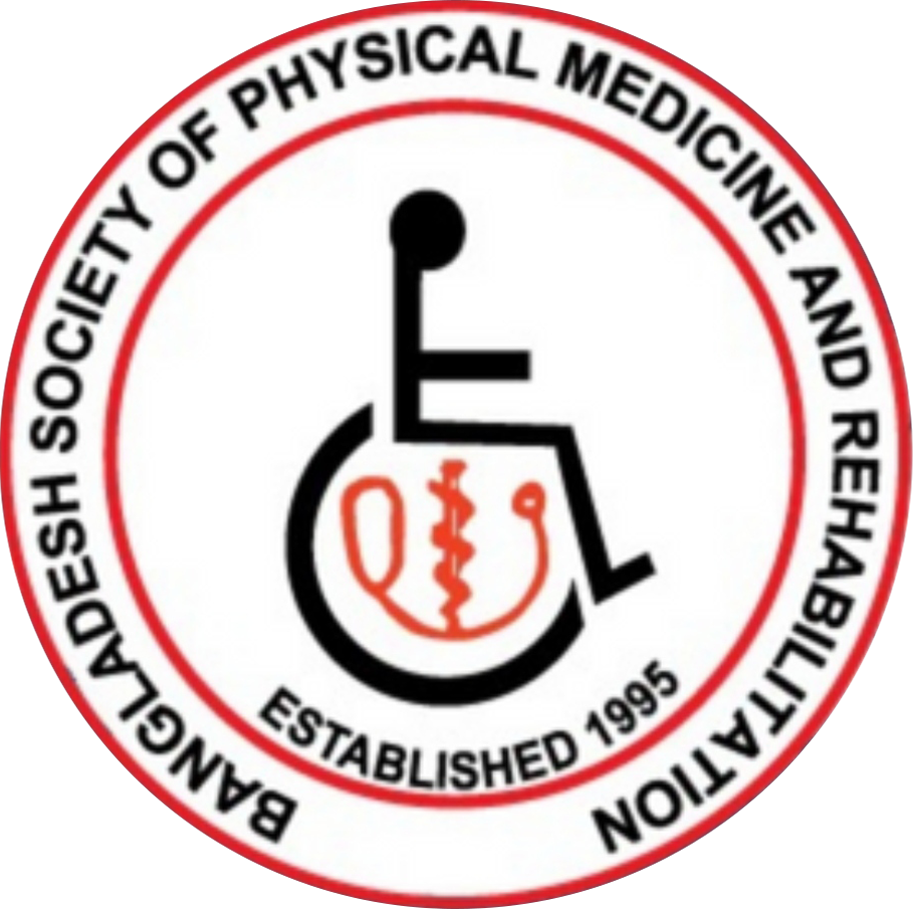
Find a Physiatrist
Search for physiatrists by location
Search Filters
Latest Published Notices
See AllAbout BSPMR
Established in 1995, the Bangladesh Society of Physical Medicine and Rehabilitation (BSPMR) is the leading professional organization dedicated to advancing Physical Medicine and Rehabilitation (PM&R) in Bangladesh. As the primary body of PMR physicians, BSPMR is committed to promoting comprehensive, evidence-based, and patient-centered rehabilitation care.
BSPMR unites specialists, academicians, researchers, and allied health professionals to enhance the quality of life for individuals with impairments, disabilities, and functional limitations. The society provides PMR-related medical education through various programs, including CMEs, workshops, fellowships, and national conferences.
BSPMR serves as a dynamic platform for knowledge sharing, professional development, advocacy, and collaborative research in rehabilitation medicine. It plays a crucial role in:
- Enhancing awareness of PM&R among healthcare providers, policymakers, and the public.
- Advocating for accessible and equitable rehabilitation services.
- Contributing to government policies for persons with disabilities.
- Catalyzing national and international collaborations to expand opportunities for members, including training, scholarships, and research.
- Liaising with the government and other agencies.
Key Objectives:
- Upholding the highest standards of PM&R practice.
- Facilitating continuous professional development.
- Encouraging clinical research and innovation.
- Fostering national and international collaboration.
- Raising public awareness about disability prevention and comprehensive rehabilitation care.
Core Activities:
- Organizing scientific conferences, seminars, and workshops.
- Publishing guidelines, journals, and newsletters.
- Providing training and capacity-building initiatives.
- Advocating for the rights of persons with disabilities.
- Supporting research and academic activities.
- Conducting community-based rehabilitation awareness programs.
BSPMR is committed to building a healthier, more inclusive, and empowered society where individuals with physical challenges receive the care, respect, and opportunities they deserve.
Join us in our mission to advance rehabilitation medicine in Bangladesh.
